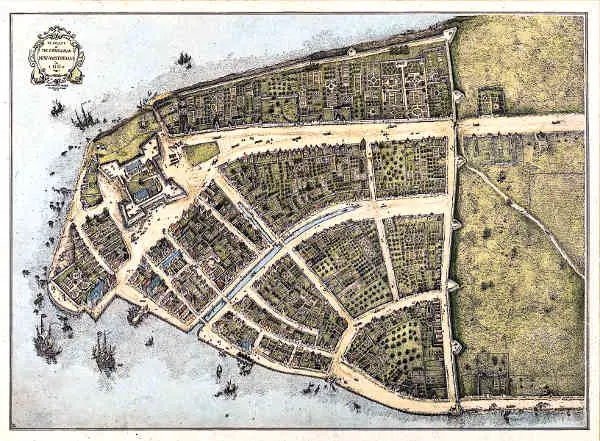New Jersey Colony
New Jersey Colony – History of ‘New Jersey Colony’ in the Colonial Period!
New Jersey Colony became one of the famous British 13 colonies that were split into 3 areas – New England Colonies, Middle Colonies, Southern Colonies.
New Jersey was part of a group of colonies that became known as the ‘Middle Colonies’ which also includes Delaware, New Jersey, Pennsylvanian and New Netherlands. New Netherlands would later be re-named New York after it was captured from the Dutch by British Forces. The New Jersey Colony would become present day New Jersey.
Power Struggle for Control
There was a power struggle between the Swedish, Dutch and later English for control of the region and because of this it changed hands a few times. The region had been ruled by Swedish and the Dutch but it eventually became under the control of English Forces. New Jersey got it’s name after the British captured it, with the Surrender of ‘Fort Amsterdam’ and re-named the Colony New Jersey after the Isle of Jersey in the English Channel.

Founders
The New Jersey Colony was founded by Sir George Carteret and Lord Berkeley in 1664. The New Jersey Colony was originally named the Province of New Jersey, after the British island named Jersey. Prior to 1664 when it was surrendered to the English, the New Jersey Colony region had been ruled by Swedish and Dutch.
King Charles II would hand over the land to the West of the Hudson river to the Duke of York. The Duke of York was the kings brother and would eventually become King James II of England.
Later Two friends of King James II of England would receive the lands between the Hudson River and the Delaware River – Sir George Carteret and Lord Berkeley of Stratton.
These lands would become known as the Province of New Jersey.
Quakers and Religious Freedom
Sir George Carteret and Lord Berkeley of Stratton, two English Lords would become Proprietors of New Jersey. They would go on to create new freedom of religion laws to entice new settlers who felt persecuted for their religious beliefs in their own colonies and countries.
Lord Berkeley would later sell his West Jersey land holdings to two English Quakers called Edward Byllynge and John Fenwick – Many Quakers settled in New Jersey, because of the religious freedoms it offered from the English (Church of England).
New Jersey Fast Facts
1601 – The Province of New Jersey becomes a Colony of New Netherlands.
1664 – Britain takes control of the region after the Dutch Surrender Fort Amsterdam.
1664 – Capture of Fort Amsterdam gives the British total control over the entire Mid-Atlantic region.
1664 – King Charles II gives a Royal colony that covers New Netherlands and present-day Maine to his brother the ‘Duke of York’.
1664 – Duke of York gifts lands between the Hudson and Delaware River to Sir George Carteret in settlement of a debt owe.
1665 – Freedom of religion is granted to all the settlers living in New Jersey.
1665 – Philip Carteret is named the first Governor of New Jersey.
1673 – 1674 – The Dutch re-captured the region for a brief period.
1674 – Lord Berkeley sells his share in the colony to Edward Byllynge a Quaker and Entrepreneur from London, England.
1702 – East and West Jersey are merged and made into a united Royal Colony by Queen Anne.
1738 – Edward Hyde, 3rd Earl of Clarendon is recalled to England in 1708 over charges of bribery and corruption.
1738 – Lewis Morris is appointed New Jersey Governor by King George II .
1773 – New Jerseys final borders are agreed upon.
1776 – A Provincial Congress of New Jersey is created to to govern the colony.
1776 – New Jersey State Constitution is enacted to join in a declaration of independence.
